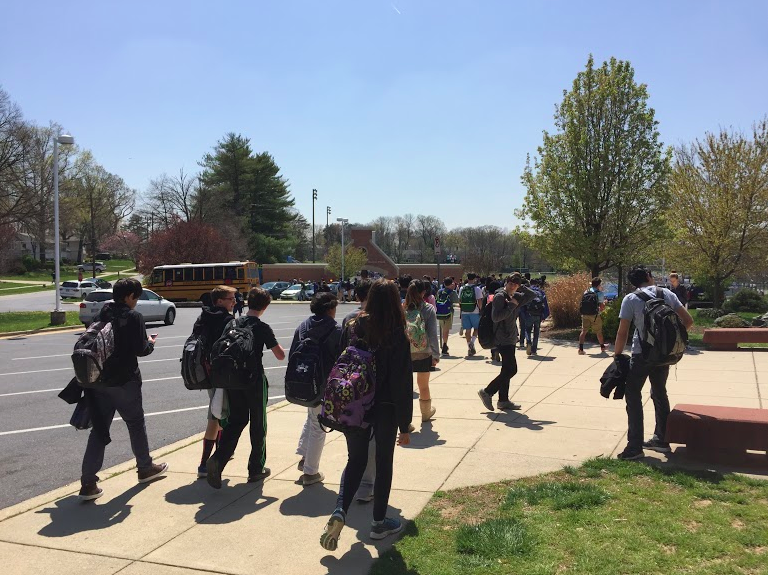CHS’s Current Fire Drill Plans Need to be Reevaluated
Photo Courtesy of Ariel Levchenko
Pep rallies are scheduled for nice days, why not fire drills?
May 3, 2016
So here’s a problem that has stu- dents burning up—what’s up with the fire drills?
Students may remember the fire drill that they were forced to suffer through on the freezing morning of April 5, as that unexpected, hated bell rang out, disrupting class and sum- moning both students and teachers outside to fulfill their sacred duty: standing outside in the winter weather.
Now, before someone explodes with righteous anger and derision, nobody is disputing the need for fire drills. They’re a good idea; people must be prepared for the unexpected. But the question arises; must they always be scheduled on a day with sub-Arctic weather?
Unexpected fire drills exist to train students and teachers to be ready, at the drop of a hat, to stop what they’re doing and get out of the building in a quick, orderly and safe fashion. However, they accomplish much more than that.
Many students, upon entering the hallowed halls of CHS decide that they’d rather not lug around their coats, scarves, gloves and other paraphernalia of the cold, and instead decide to deposit them in the handily- provided lockers or simply just don’t
bring outerwear appropriate for the weather.
The problem with that is that the entire purpose of an unexpected fire drill is that people…aren’t expecting it. They aren’t allowed to go to their locker and get a coat, they can’t grab a warm hat and a scarf, they’re essentially forced to go outside into the freezing cold with usually nothing more than a cotton tee-shirt and some jeans. Now, some students choose to carry their coats with them, but some teachers won’t even give the chance to put it on, instead hurrying them to get out the door as quickly as possible.
What possible argument could there be for this? That it acclimates students to the cold? There are other ways of doing that, such as when the school blasts the AC on days that are already cold enough.
According to assistant principal Maniya Jules, the administrator in charge of scheduling fire drills, there are two types of fire drills – the an- nounced ones, which are made known to teachers, administrators and some- times students (depending if the teach- ers tell them), and the unannounced ones, which are known only to admin- istration and security.
Jules said that she tries to plan the announced fire drills to occur during winter, which would seem to give stu- dents a chance to get their warm clothes in
the times that are coldest, but it’s easily evident that almost every year, March and April can still be extremely cold. That isn’t to say that spring fire drills must be announced, but they should be planned better, with consideration for the cold weather that happens almost every year at that time.
But this problem is uneven, because certain teachers are aware of the suppos- edly unexpected fire drills, and inform their students of it, thereby giving them the chance to go and retrieve their warm clothes. How is this fair or just? It’s nei- ther, and it utterly defeats the purpose of an unexpected drill—these students aren’t being caught off-guard, they’re prepared, so the drill isn’t preparing them for anything at all.
Additionally, other students drive to school and park on the side of the road next to CHS. When students go outside to turn into meat popsicles, the lucky few (mostly seniors with a sprinkle of juniors) go to their cars, turn on the heat, and start blasting “Burnin’ Up” or the soundtrack from Frozen.
Now, these fire drills are decided upon at the beginning of the year, before anyone knows anything about snow days, cold days or any other un- foreseeable event.
According to Jules, changing a planned fire drill would require too much reorganization and create lo- gistical problems, since teachers plan around the drills when setting up their lessons. It could also be costly if science students must evacuate the school in the middle of time-sensitive experiments.
However, this past drill was a teach- er-unannounced fire drill, and there are other departments in the school besides science. The administration’s actions seem to suggest that they care more about their bureaucracy and money than the schedules of the entire teach- ing body and the safety and well being of the students, which should be their primary concern.
Fire drills are important. Students should be prepared for the unexpected. But maybe, just maybe, try to plan them so as to not have over 2,000 students quadruple their chances of getting pneumonia? Just a thought.


